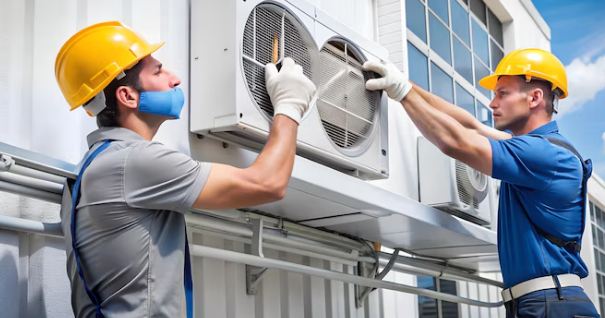knowing HVAC maintenance service : Good indoor air quality (IAQ) is essential for health, well-being, and comfort. People typically spend 90% of their time indoors, whether at home, work, or school. If indoor air is contaminated with pollutants like dust, allergens, chemicals, or mold, it can have significant short- and long-term health implications.
You must remember that poor air quality can lead to respiratory problems such as asthma, bronchitis, and allergies. Besides, fine particles (PM2.5) from pollution, smoke, or dust can cause chronic breathing issues.Long-term exposure to polluted indoor air can increase the risk of cardiovascular diseases, lung cancer, and other chronic health problems. There is also a situation called Sick Building Syndrome where occupants of a building experience health issues due to poor air quality. Such symptoms include headaches, dizziness, nausea, and fatigue.
Air conditioners (ACs) are not only essential for maintaining comfortable temperatures but also play a crucial role in enhancing indoor air quality (IAQ). Modern AC systems are designed to filter, ventilate, and regulate air, ensuring it stays clean and healthy. However, an HVAC maintenance service can help eradicate factors that prevent your AC unit from performing smoothly.
How an Air Conditioner Contributes to Improved Air Quality:
Air Filtration and Allergen Removal
- Filters Trap Pollutants:
AC units typically come with filters that capture dust, pollen, pet dander, and other airborne particles.
- HEPA and Activated Carbon Filters:
Advanced air conditioners may use HEPA filters to capture microscopic allergens and carbon filters to neutralize odors and harmful gases. You can discuss it with your HVAC specialist.
- Reduces Indoor Allergens:
This helps people with asthma or allergies by reducing exposure to common triggers like dust mites and mold spores.
Humidity Control
- Reduces Mold and Mildew Growth:
Air conditioners regulate humidity levels, preventing excess moisture that fosters mold, mildew, and bacterial growth.
- Ideal Humidity Levels:
Maintaining 30-50% humidity makes the indoor environment less hospitable for allergens like dust mites.
Fresh Air Ventilation
- Ventilation Systems in Central ACs:
Some AC systems, such as HVACs (Heating, Ventilation, and Air Conditioning), introduce fresh outdoor air into the indoor environment, preventing stale air accumulation.
- Prevents Pollutant Build-up:
Regular air circulation helps dilute volatile organic compounds (VOCs) and other indoor pollutants from furniture, paints, or cleaning products.
Elimination of Harmful Gases and Odors
- Carbon Filters Remove VOCs:
Modern AC systems equipped with carbon or UV filters can neutralize VOCs from air fresheners, paints, and other chemicals.
- Prevents Smoke and Kitchen Odors:
Air conditioners ensure that smoke, cooking fumes, and other odors don’t linger for long.
Reduces Airborne Microbes
- UV Light Technology in AC Systems:
Some advanced air conditioners include UV light components that kill bacteria, viruses, and mold spores as air passes through the system.
- Improves Health and Safety:
This feature is especially useful for preventing the spread of airborne diseases.
Minimizes Outdoor Pollutants Indoors
- Filtered Air Inflows:
In areas with high outdoor pollution (e.g., dust or smog), the filters in AC systems prevent the entry of PM2.5 particles, smoke, and other pollutants.
- Seals Air Leaks:
Air conditioners ensure that windows and doors remain shut, preventing outdoor pollutants from entering the indoor environment.
Maintains Consistent Air Quality
- Continuous Air Circulation:
AC systems maintain steady airflow, preventing areas of stagnant air that could trap pollutants.
- Smart Systems with IAQ Sensors:
Some modern ACs come with sensors that monitor and adjust air quality automatically, improving comfort and safety in real time.
Maintaining pure indoor air quality is essential for promoting health, comfort, and productivity. With the rise in air pollution and environmental toxins, ensuring a clean indoor environment becomes even more critical. Prioritizing IAQ helps reduce health risks, protect vulnerable individuals, and improve the quality of life for everyone in the space.
Air conditioners are essential for more than just cooling—they actively improve indoor air quality by filtering pollutants, controlling humidity, ventilating air, and reducing microbial presence. With proper Air Conditioner service and maintenance, the system can significantly enhance comfort, health, and safety, ensuring a cleaner and healthier indoor environment.

